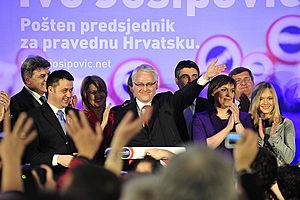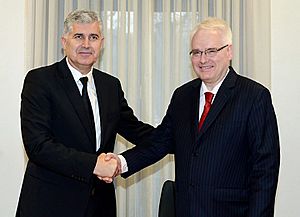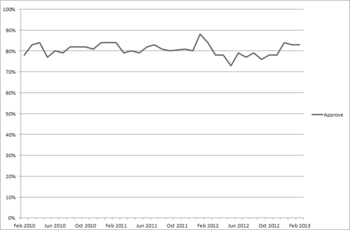Ivo Josipović facts for kids
Quick facts for kids
Ivo Josipović
|
|
|---|---|
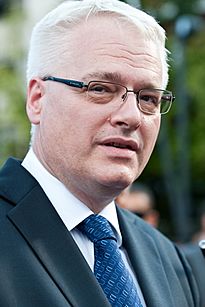
Josipović in 2011
|
|
| President of Croatia | |
| In office 19 February 2010 – 18 February 2015 |
|
| Prime Minister | Jadranka Kosor Zoran Milanović |
| Preceded by | Stjepan Mesić |
| Succeeded by | Kolinda Grabar-Kitarović |
| Member of Parliament | |
| In office 22 December 2003 – 18 February 2010 |
|
| Constituency | I electoral district |
| President of the Forward Croatia-Progressive Alliance | |
| In office 31 May 2015 – 11 April 2019 |
|
| Preceded by | Position established |
| Succeeded by | Position abolished |
| Personal details | |
| Born | 28 August 1957 Zagreb, PR Croatia, FPR Yugoslavia |
| Political party | Social Democratic Party (1990–1994, 2008–2010, 2019–present) |
| Other political affiliations |
League of Communists of Yugoslavia (1980–1990) Forward Croatia-Progressive Alliance (2015–2019) |
| Spouse |
Tatjana Klepac
(m. 1990) |
| Children | 1 |
| Alma mater | University of Zagreb |
| Profession |
|
| Signature | |
Ivo Josipović (born August 28, 1957) is a Croatian academic, lawyer, composer, and politician. He served as the president of Croatia from 2010 to 2015.
Josipović first became involved in politics as a member of the League of Communists of Yugoslavia. He helped change the League of Communists of Croatia into the Social Democratic Party of Croatia (SDP) by writing its first rules. He left politics in 1994 but returned in 2003. He won a seat in the Croatian Parliament as an independent candidate on the SDP party list. He was re-elected to parliament as an SDP member in 2007. Besides politics, Josipović has worked as a university professor, legal expert, musician, and composer. He has a Ph.D. in Law and advanced degrees in music.
After his first term in Parliament ended in January 2008, he ran in the 2009–10 Croatian presidential election. He was the candidate for the Social Democratic Party of Croatia (SDP), which he had rejoined in January 2008. In the first round, he won 32.4% of the votes, more than eleven other candidates. He then competed against Milan Bandić, an independent candidate, in the second round. Josipović won the election with 60.26% of the votes.
His campaign was called "New Justice." It aimed to create new laws to fix social problems, corruption, and organized crime. This included protecting individual rights and promoting important values like equality, human rights, justice, hard work, kindness, and creativity. Josipović became president on February 18, 2010, in Zagreb. His term officially started at midnight on February 19.
Josipović tried to be re-elected in the 2014–15 Croatian presidential election on December 28, 2014. He was supported by a group of four parties led by the SDP. Josipović won 38.46% of the votes in the first round, just ahead of Kolinda Grabar-Kitarović. They went to a second round on January 11, 2015. Josipović lost by a small number of votes, getting 49.3% compared to Grabar-Kitarović's 50.7%. He was the first President of Croatia not to be re-elected for a second term.
Contents
Early Life and Education
Josipović's parents moved to Zagreb in 1956 from a small town called Baška Voda. He was born about a year later. As a high school student from 1972 to 1976, Josipović attended both the V. Gymnasium and a music school in Zagreb. When he was a teenager, he was a promising football player. He is married to Tatjana, who is a law professor. They have one daughter, Lana, born around 1991.
Besides his native Croatian, he speaks English very well and understands some German.
Law Studies and Career
Josipović studied at the Faculty of Law at the University of Zagreb. He passed his bar examination in 1980. He earned his Master of Arts degree in criminal law in 1985 and his Ph.D. in criminal sciences in 1994. He started teaching at the same law faculty in 1984. He later became a professor of criminal procedure law and international criminal law.
Josipović has been a visiting researcher at several well-known institutes. He has published over 85 academic papers in various journals. In 1994, he helped start the Croatian Law Center. Josipović also helped Croatia in international legal cases. He worked as an expert for the Council of Europe to check prisons in other countries.
Music Career
After finishing music school, he studied composition at the Zagreb Music Academy. He graduated in 1983. Between 1987 and 2004, Josipović also taught at the Zagreb Music Academy.
Josipović has composed about 50 pieces of chamber music for different instruments and orchestras. In 1985, he won an award for his composition "Samba da Camera." He won two more awards for his music in 1999 and 2000. His other well-known pieces include "The Glass Bead Game" and "Tuba Ludens." Many musicians in Croatia and other countries perform his music. Since 1991, Josipović has also been the director of the Music Biennale Zagreb, an international festival for modern classical music.
During his 2010 election campaign, Josipović said that as president, he would compose an opera about the life of John Lennon. On April 22, 2023, his opera, Lennon, premiered in Croatia's National Theatre. It is about John Lennon's last days and the people important to him.
Film and Media
Josipović was interviewed in Boris Malagurski's documentary film The Weight of Chains 2 (2014). He also lent his voice to the third Toy Story film and a short animated film called Night and Day. In the animated film, Josipović says, "Best things in life are unknown, turn to new things." In 2014, when opening the Pula Film Festival, President Josipović encouraged the audience to enjoy movies and art. He said that filmmakers are like magicians who bring talent and love for art to the screen.
Political Career
In 1980, Josipović joined the League of Communists of Croatia. He played a key role in changing this party into the Social Democratic Party of Croatia (SDP). In 1994, he left politics and the SDP to focus on law and music. In 2003, he returned to politics at the invitation of the prime minister at the time, Ivica Račan. He became an independent Member of Parliament (MP) with the SDP. In 2005, he also served in the Assembly of the City of Zagreb. In 2007, he was re-elected to the Croatian Parliament. He officially rejoined the SDP in 2008. On July 12, 2009, he was chosen as the party's official candidate for president. As an MP, he worked on various parliamentary committees dealing with laws and the political system.
Presidential Election 2010
After serving two terms, the president at the time, Stjepan Mesić, could not run again in the 2009 presidential election. On June 20, 2009, Josipović was nominated as one of the SDP candidates. He won a primary election against Ljubo Jurčić on July 12, becoming the party's official candidate.
Josipović's campaign slogan was 'Justice for Croatia'. He started his campaign with a rally in Zagreb. He spoke about the government and the prime minister, Jadranka Kosor, saying they were not helping ordinary people and not dealing with corruption.
On December 27, 2009, Josipović won the first round of the presidential election with 32.42% of the votes. He then faced Milan Bandić, an independent candidate, in the second round on January 10, 2010. On January 10, 2010, he was elected as the third president of Croatia with 60.26% of the votes, defeating Bandić.
President of Croatia

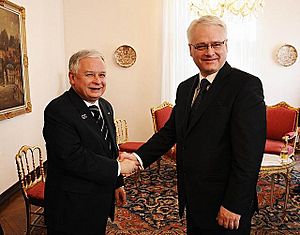

In April 2010, Josipović met with religious leaders in Bosnia and Herzegovina. They visited sites of past conflicts and paid respect to the victims. Josipović made an official visit to Bosnia and Herzegovina and spoke to their Parliament. In his speech, he expressed "deep regret" for Croatia's involvement in past conflicts in the 1990s. Some political groups in Croatia criticized this apology.
Josipović chose some advisors who caused minor issues. One advisor for agriculture was dismissed shortly after being appointed due to unpaid tax debts. Another advisor, a former journalist, left his position after publishing a column that caused controversy.
In May 2010, Josipović met with leaders from Republika Srpska and a Bosniak leader. He visited a site of past killings to honor the victims. During a visit to Israel in February 2012, Josipović apologized for terrible acts committed against Jewish people by a Croatian regime in the 1940s. Some in Croatia criticized this, as a previous president had already apologized. Josipović also said he was "the son of Tito's partisan," referring to a historical anti-fascist movement. In May 2014, at a memorial for victims of a concentration camp, Josipović described the crimes there as very serious. He emphasized that most Croatian people fought against such policies during World War II. He urged everyone to remember that hatred and intolerance are still present today, so that such crimes never happen again.
Public Opinion
In 2010, Josipović had very high approval ratings, averaging 81%. His ratings reached as high as 84% in 2010 and 2011. This made him one of the most popular Croatian politicians in the past 20 years. However, his popularity slightly decreased in the first half of 2012, from over 80% to around 68.8%. Even so, he remained the most popular active Croatian politician.
| Date | Event | Approval (%) |
|---|---|---|
| February 27, 2010 | Inauguration | 78 |
| March 25, 2010 | First month in office | 83 |
| April 30, 2010 | After apologizing in Croatia's name | 84 |
| November 25, 2010 | Serbian president apologizes for Vukovar | 81 |
| January 28, 2012 | Highest Approval | 88 |
| August 25, 2014 | Lowest Approval | 68 |
Presidential Election 2015
President Josipović announced he would seek re-election in the 2014–15 Croatian presidential election. His campaign focused on changing the constitution and giving more power to local areas in Croatia.
The first round of elections was on December 28, 2014. Josipović was slightly ahead of his main challenger, Kolinda Grabar-Kitarović. Josipović received 38.46% of the votes, which was about 22,000 more votes than Grabar-Kitarović's 37.22%. Since neither won more than 50% of the votes, they went to a second round on January 11, 2015. On election night, Grabar-Kitarović was predicted to win. Although Josipović had an early lead in the official results, Grabar-Kitarović eventually won by a small difference of about 32,509 votes. Josipović accepted his defeat, and Grabar-Kitarović became the first female president of Croatia. His term officially ended at midnight on February 19, 2015.
After losing the election, Josipović started a new political party called Forward Croatia-Progressive Alliance. He announced that he planned to run in the 2015 Croatian parliamentary election in November 2015. Josipović also chose not to have his own office and staff, even though he was allowed to have them for five years after leaving the presidency.
Parliamentary Elections
2015 Parliamentary Election
Josipović's Forward Croatia-Progressive Alliance formed a group with the People's Party - Reformists. Josipović was a candidate in his local area, where the group won only 1.01% of the votes. This was less than the 1.54% they received across the country.
2020 Parliamentary Election
Josipović was a candidate in the 1st electoral district as part of the Restart Coalition. He was not successful. He received 3,013 votes, which was 7.78% of all votes for the Restart Coalition in his district. This was below the 10% needed to be elected.
Honours and Awards
| Award or decoration | Country | Date | Place | |
|---|---|---|---|---|
| Order of Danica Hrvatska for Culture | 1999 | |||
| Order of the White Rose of Finland | 2011 | |||
| Order of St. Olav | May 12, 2011 | Zagreb | ||
| Order of Merit of the Italian Republic | July 6, 2011 | Zagreb | ||
| Order of the Three Stars | April 2, 2012 | Zagreb | ||
| Order of the Seraphim | April 16, 2013 | Zagreb | ||
| Order of the Polar Star | April 16, 2013 | Zagreb | ||
| Order of the White Eagle | May 11, 2013 | Zagreb | ||
| Order of the Elephant | October 21, 2014 | Zagreb | ||
See also
 In Spanish: Ivo Josipović para niños
In Spanish: Ivo Josipović para niños
 | Dorothy Vaughan |
 | Charles Henry Turner |
 | Hildrus Poindexter |
 | Henry Cecil McBay |


